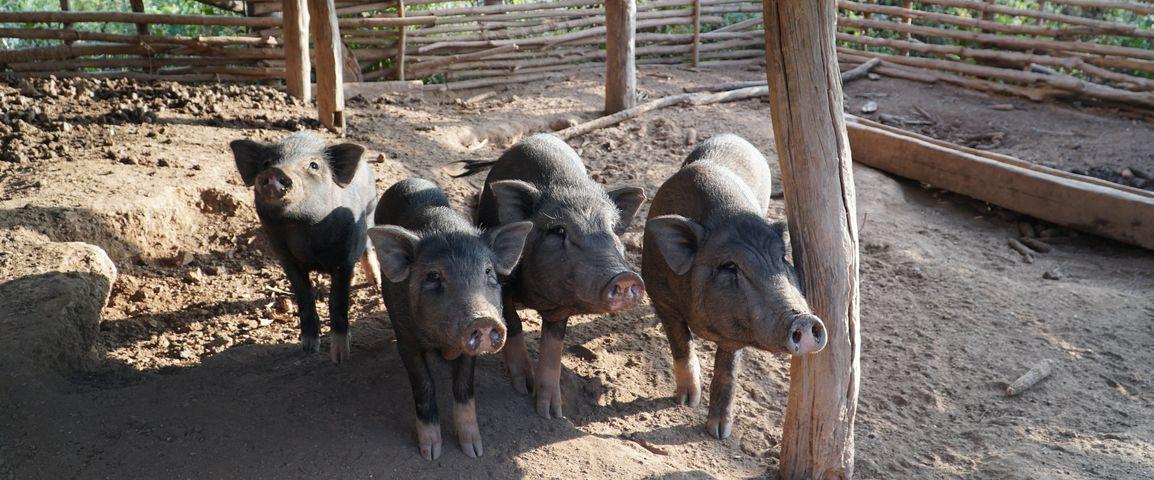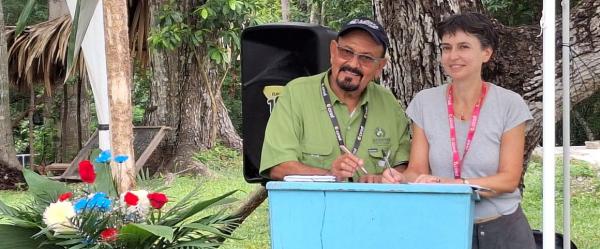Science at work 16 December 2025
- Home
- Press area
- Press releases
- International cooperation programme on biosecurity on pig farms in Asia
African swine fever: launch of an international cooperation programme on biosecurity

Pig farm in Laos © C. Dangléant, CIRAD
African swine fever (ASF) is a highly resistant viral disease that exclusively affects pigs and wild boars. Since the first outbreak discovered in China in August 2018, the virus has spread at high speed in the region, hitting Vietnam, Cambodia and Laos, before spreading to insular Southeast Asia, for instance the Philippines. ASF threatens all the pork value chains and industries in Southeast Asia, with economic impacts (loss of income for farmers), and also risks for the food security and nutrition of local populations, amplified by the economic crisis caused by Covid-19.
Everyone has a role to play in preventing the spread of African swine fever
Biosecurity measures, combined with monitoring and controls, are crucial to prevent and respond to the ASF crisis and to other enzootic or emerging animal diseases. They also contribute to reducing antimicrobial use and the consequent antimicrobial resistance.
Complementing the recommendations of the World Organization for Animal Health (WOAH) and the Food and Agriculture Organization of the United Nations (FAO), the BIG programme is aimed at all stakeholders in the pork value chain and at veterinary services in the beneficiary countries. It will strengthen regional cooperation in Southeast Asia, within the framework of the France-ASEAN development partnership officially launched in March 2021. Cross-cutting multi-stakeholder collaborations will make it possible to address those global threats collectively and improve the long-term resilience of animal husbandry systems, in which animal health plays a vital role.
The programme is aimed at:
- Decision-makers in charge of public policy on prevention and control of animal diseases;
- Rural populations via community-based animal health workers and local government units;
- Official veterinarians and field veterinarians, both public and private;
- Pig farmers, including family farms;
- Animal health laboratory staff, backed by the expertise of ANSES and ADILVA.
Each stage of the programme aims to improve ASF control in the countries concerned (Cambodia, Laos, Philippines, Vietnam).
Six main actions will be carried out over the three years, by the four partners (VetAgro Sup, AVSF, CIRAD, IFIP):
1. Improve knowledge of the impacts of ASF and identify control measures implemented in Southeast Asia: prevalence and incidence surveys, economic surveys, participatory workshops, etc.;
2. Develop, test and disseminate operational tools for better control of ASF: awareness and communication campaigns;
3. Train field stakeholders to control ASF better: surveillance and control plans, public-private partnerships;
4. Train official veterinarians in sanitary and phytosanitary standards (SPS) with a focus on biosecurity: digital training modules, training of trainers;
5. Train pig farmers: design of a digital application, on-farm training;
6. Strengthen diagnostic capacity of animal health laboratory staff (for ASF and other pig diseases): mapping of needs, staff training;
CIRAD's contribution will focus on the identification and co-construction of socioeconomic and policymaking operations aimed at guaranteeing the acceptability of stricter monitoring and biosecurity measures on a national level, to control ASF more effectively in the four countries concerned. To this end, the following activities are planned:
- a detailed description of existing stakeholders and institutional structures, to identify response capacity in Southeast Asia;
- a macro- and micro-analysis of the economic impacts of ASF;
- the drafting, with all the stakeholders concerned, of strategies aimed at improving pig disease monitoring and control, based on behavioural economic surveys and participatory modelling tools.
Reference
African swine fever (ASF) activities in Southeast Asia carried out by CIRAD and partners



























